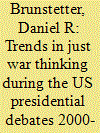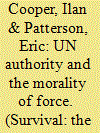|
|
|
Sort Order |
|
|
|
Items / Page
|
|
|
|
|
|
|
| Srl | Item |
| 1 |
ID:
127810


|
|
|
|
|
| Publication |
2014.
|
| Summary/Abstract |
Taking as a starting point the case of Iraq, it is argued that the administration of this country by the Coalition from May 2003 onward, is an American example of a culture-bound type of occupation. Already in the early eighteenth-century international differences in occupation regimes between France, England, and the Dutch Republic are discernable. Therefore, in all likelihood, the United States also developed in the course of their history a characteristic pattern of controlling foreign territories. This American modus occupandi could very well stem from the English style of occupying, but may differ in two important respects: it usually is a "short-winded affair," and it can either come down to a rather peaceful "laissez-faire" or to a war-like type of occupation. Finally, the question is discussed in how far such a style of occupation can result in a more or less "constructive" form of foreign domination. In the author's impression, occupational "success" or "failure" probably depends as much, if not more, on the state of the occupied system-to wit, the degree of unison between native elites-as on the strategy of the occupant.
|
|
|
|
|
|
|
|
|
|
|
|
|
|
|
|
| 2 |
ID:
084307


|
|
|
|
|
| Publication |
2008.
|
| Summary/Abstract |
The requirement of legitimate authority, though central to medieval and modern interpretations of the just war tradition, has received less attention in the contemporary literature than the other requirements of jus ad bellum. The usual interpretation holds that the kind of entities that have legitimate authority are states, coalitions of states, supranational institutions or national liberation movements and that these political entities are endowed with the authority to wage war. At the same time, contemporary literature on the ethics of international relations is characterized by a revival of the cosmopolitan tradition. This subjects states and quasi-states to stringent legitimacy conditions: according to cosmopolitans, states are internally legitimate-have the right to coerce their own members-if, and only if, they respect the latter's fundamental human rights. The principle of legitimate authority has been criticized in some recent writings on war for not taking account of the implications of (independently defended) cosmopolitan descriptions of state legitimacy. If states are subject to stringent legitimacy conditions such as those outlined above, the criticism goes, they do not possess the right to wage war simply by virtue of their being a state. Rather, the authority to resort to war should be vested in supra-national institutions as well as, or indeed, rather than, states. In this sense war becomes a mechanism for enforcing cosmopolitan moral norms, as opposed to a mechanism for resolving interstate disputes. This cosmopolitan account of legitimate authority needs to be developed to include supra-national institutions. While the author does not deny that such institutions have the moral and legal right to wage war, the aim of this article is to cast doubt on the cogency of the requirement of legitimate authority itself-on cosmopolitan grounds. From a cosmopolitan point of view, the article argues there are very good reasons for dropping the requirement altogether. After sketching out a plausible cosmopolitan account of justice in section two, section three shows that a war need not be waged by a legitimate authority in order to qualify as a just war.
|
|
|
|
|
|
|
|
|
|
|
|
|
|
|
|
| 3 |
ID:
148653


|
|
|
|
|
| Summary/Abstract |
This article examines the legitimacy of the use of force by armed nonstate actors resisting the imposition of state rule over territories they control. We focus on the rights of warlords: subnational strongmen who seek autonomy within geographically demarcated territories, but not secession or control of the state itself. We argue that behind the resistance to state-building lies a twofold question of legitimate authority: the authority of states to consolidate power within their own internationally recognized borders and the authority of warlords to resist that expansion, by force if necessary, when it threatens social order and the protection of basic rights. This article draws on just war theory to develop a set of conditions under which such resistance may be justified, explores the argument's practical implications for state-building under the tutelage of third parties (e.g., the United Nations), and demonstrates its empirical relevance through an application to Afghanistan.
|
|
|
|
|
|
|
|
|
|
|
|
|
|
|
|
| 4 |
ID:
131698


|
|
|
|
|
| Publication |
2014.
|
| Summary/Abstract |
In this article, I explore the place of the just war tradition in US foreign policy by examining the use of just war language in the presidential debates in 2000 (Bush-Gore), 2004 (Bush-Kerry), 2008 (McCain-Obama), and 2012 (Obama-Romney). While critics focus on the use and abuse of just war language as rhetorical gloss to persuade the public an upcoming conflict is morally legitimate while serving the national interest, the debates showcase just war principles as part of a language of critical engagement. Each debate cycle allowed for critical reflection on the foreign policy decisions and just war philosophy of the incumbent president. During the time period I examine, the process of critical engagement identified two moral shortcomings of the past - the failure to act to stop the genocide in Rwanda and the premature use of force in Iraq. These perceived failures catalysed convergence, across party lines, on the way some jus ad bellum principles were understood: Just cause as including the moral obligation to intervene in some way to stop genocide and the renewed salience of the principle of last resort. There remained, however, stark differences in the way legitimate authority was understood.
|
|
|
|
|
|
|
|
|
|
|
|
|
|
|
|
| 5 |
ID:
109897


|
|
|
|
|
|
|
|